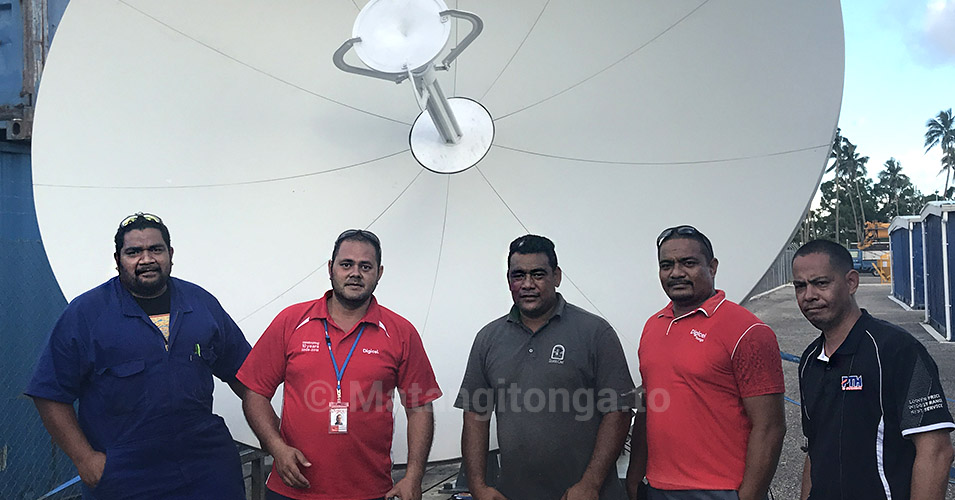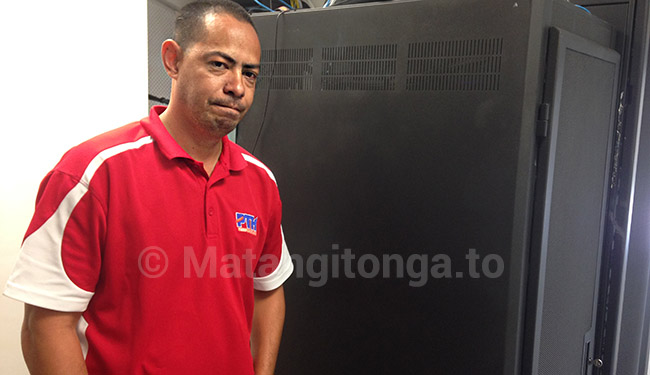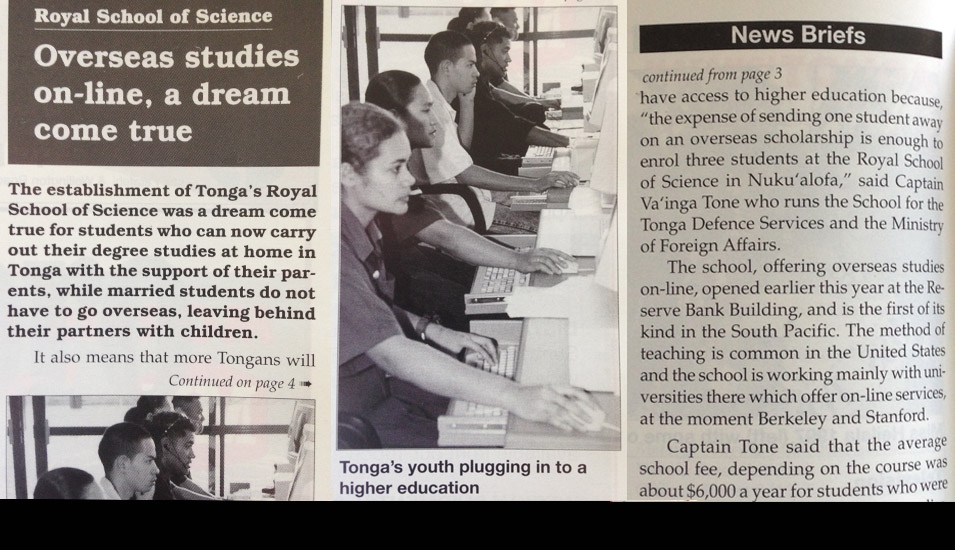
By Mary Lyn Fonua
Tonga has been rescued from a very serious communications black-out this week by a small tech start-up venture in Nuku'alofa, run by smart, young adventurous Tongans and their partner company in Vanuatu, who have managed to swing some extra satellite capacity to Tonga.
In 2019 a total internet black-out scenario is likely to be everyone's worst nightmare – Tonga has become so dependent on the internet. Whether you are in fishing, farming, business or government, or simply at home, a communications blackout can rapidly become an economic and social disaster killing fragile businesses and disrupting life-saving communications and community services.
If it had not been for the quick thinking and generous commitments made by EziNET in Tonga and Wantok Wireless in Vanuatu, working in a collective effort with Tonga’s two main internet network operators this week – then the priority internet services running in Nuku'alofa at the moment would not have happened.
While today, Saturday (Day 6 of the cable blackout) there is still nowhere near enough internet capacity for the public to enjoy normal services, some priority services have been able to get back up and running via satellite, while Network Operators are still scrambling to try and further increase the satellite capacity for Tonga.
If it was not for the fact that a local Tongan company decided to invest overseas in a Network Operator in Vanuatu, then Tonga would not have been able to double its satellite connectivity on Thursday. It was intelligent management of that overseas asset and willingness by local business people to take an extreme risk that is now allowing Tonga to work its way out of its communications crisis.
While we have experienced communications going down for hours or even a day during severe tropical cyclones, the now six days, and ongoing, cable blackout is simply unparalleled.
No Plan B
The truth is, that in spite of expert advice offered ever since the submarine cable was rolled out in 2013, the Tonga Government had no Plan B and no standby satellite capacity in place to serve the nation in the event of a cable blackout.
Former satellite facilities operated by the two major local networks, Tonga Communications Corporation and Digicel Tonga had become somewhat redundant, while their new investments were focused on competitively developing their data and internet based services after the powerful new fibre optic cable came online.
Then the worst-case happened at 8:30pm on Sunday 20 January, when the Tonga cable was suddenly cut in two places, and Tonga woke up on Monday morning with little or no public internet connection to the world. Access to mobile data died, along with cable television services, overseas phone calls, email services, money transfer operations, online banking, Eftpos terminals, airport terminals, internet browsing, messaging, weather alerts, Google searches, file sharing, streaming Netflix and the Tongan diaspora's beloved Facebook, airline and accommodation bookings, uploads, downloads and more – were all down and as good as dead.
Unusually and intriguingly, the Tonga cable is severed in two places between Fiji and Tonga, and also between Tonga and Vava'u, and right now no one seems to know why.
This week some self-respecting Tongans added “SOL” to their lingo.
Geek heroes
On Monday Justin Kaitapu, the CIO for the Chapman family group of companies, managing the technical operations for EziNET in Tonga and Wantok Wireless in Vanuatu, was about to hop on a flight at Tongatapu’s Fua'amotu Airport on a routine visit to their Port Vila head office, when he received a phone call from his boss John Paul Chapman begging him to stay in Tonga to work on easing the situation.
Justin and John Paul are the two young directors of EziNET, an ISP provider that was registered in 2013 by Pacific Finance and Investments Ltd. After years of painstaking IT development work by the local team, in November last year EziNET was fully registered as Tonga's third Network Provider and was providing a limited satellite connection. “We were just playing around with a few things,” said Justin. The Chapman family are also shareholders and directors of Wantok Wireless, in Vanuatu where Justin was supposed to be going on Monday.
Since then Justin hasn't had much sleep.
EziNet -which consists of only three people, John Paul, Justin and his brother Salesi who is also an IT engineer, immediately got to work and passed their extra satellite capacity to its competitor networks TCC and Digicel in a collaborative effort to get Tonga reconnected to the world.
“It's up to them how they manage that capacity within their own networks,” Justin told Matangi Tonga. “Each network provider will have to decide how to allocate the limited capacity to meet their customers’ needs…Everyone is doing their best to put priority on what the country needs to keep going.”
EziNET links to Kacific Satellite services and they were scrambling to find more capacity for Tonga. Kacific sent a consultant engineer, Ian Nugent from Sydney to Tonga on three hours notice to help Justin and his team.

Satellite antenna
Fortunately for Tonga, EziNET had previously imported all the parts for a new satellite antenna that they were planning to install in March 2019. It was slow going because they had not been able to interest anyone in backing a Satellite Plan B for the country.
Justin said that this week they had to accelerate their plan, and were able to install the antenna at the Small Industries Centre in a collective effort by EziNET, MEIDECC (Govt), Digicel Tonga, Tonga Cable Ltd., and TCC.
“It’s just fortunate that it was here and part of our Pacific plan. So on Tuesday and Wednesday it was all built and secured, and now under a 24 hour guard.
“Our main operation in Vanuatu, Wantok Wireless, uses both cable and satellite,” said Justin. “I asked them, can you put all your bandwidth on fibre, so I can grab all the satellite for Tonga?”
“It’s a huge risk for the business in Vanuatu, we are exposed right now, because if their fibre goes off they are put out of business - because Tonga has taken all of their satellite capacity and there’s no more. That’s why I can’t sleep at night!”
Justin said that people do not realise the risk that the company is taking. “I was surprised when JP approved the solution for Tonga because if the Vanuatu cable goes down we are dead and gone over there.”
“It's difficult, but they did it and it's taken two days work with the technical teams at both ends working hard to maximise the satellite capacity for Tonga, and so that’s how we doubled that capacity for Tonga on Thursday.”
Justin said that renting satellite space is very expensive, which is why they had to maximise the capacity they were already renting.
“Now we have maxed on what we have and there is no more,” he said.
The other Tongan Network Operators are continuing to look for more satellite capacity, but it is very difficult regionally and Tonga’s needs are so great, until the cable can be repaired over the coming weeks.
Royal School of Science
Justin said everything he put into practice this week he learned at the Royal School of Science, an initiative of Crown Prince Tupouto‘a (later Tupou V) to provide higher education online for the Tonga Defence Services in 1998. “Geeks” were unknown in Tonga at the time. He went into the army and joined the new technical education programme.
“[Tupouto'a] also brought in expert IT teachers from Silicone Valley in the US and that inspired me to learn more,” said Justin. At the time, satellite was the preferred solution for Tonga, because of the envisioned dangers of a cable breakdown. “If it was not for Tupou V’s vision, I would not be doing what I am doing now....Satellite, because of the nature of Tonga with many islands, and looking at small islands that will never have fibre, in my opinion.”

Later Justin taught at the academy, which offered some of the first HTML coding classes to the public in Tonga, and he went on to head technical operations professionally for Tonfon and Digicel Tonga networks. EziNET is his first private technical start-up operation, with the Chapman Family.
The cable blackout has presented serious challenges for Tonga and a lot of people have been working day and night to alleviate the situation.
Foreign Exchange Control Act
Wantok Wireless employing 14 people, runs most of EziNETs operations out of Vanuatu based company. While there are only three staff in Tonga.
Justin is convinced that the IT company would have been a Tongan company had it not been for the discouraging new Foreign Exchange Control Act* that came into force in Tonga last November, just when EziNET was planning to expand.
So Vanuatu seemed a safer bet to develop a communications investment, and another significant opportunity for Tonga to develop local business was lost.
“People don’t realise what a huge risk the Chapmans are taking in moving the satellite capacity over from Vanuatu for Tonga,” said Justin.
*Footnote: (The Foreign Exchange Control Act seeks to repatriate overseas assets and earnings of Tongans. In a statement approved by the Governor of the National Reserve Bank, the NRBT declared: “The FEC Act authorises the NRBT to manage the country’s foreign exchange in and out of the country and does not intend to violate a person’s Constitutional right to their property or money in Tonga. ... In the event a person chooses to convert/transfer/dispose of their property or money in exchange for foreign currency, the person forfeits that right and is subject to the exchange control directive issued under the FEC Act. In recognition of the need to develop an appropriate framework that would assure a reasonable amount of export proceeds of Tonga are returned to Tonga …”.




Comments
As usual, great coverage of
As usual, great coverage of local current affairs and especially around the recent issues with the primary internet backbone - fibre cable link.
Commendable efforts by Justin Kaitapu and ‘Etuini Liava’a and their respective colleagues doing the best they can to restore full connectivity ASAP.
So far, the takeaway learnings is an opportunity for key stakeholders to start conversations around regulatory frameworks for compulsory Disaster Recovery and Business Continuity plans for all registered ISP providers. As your article alluded to, utilising external vendors for DR solutions might be possible low cost/high performance options. Regardless, the point being, that DR/BCP solutions MUST be defined and implemented and perhaps covered financially as part of an ISPs BAU (Business As Usual) costs.
General public and consumer bodies might also see an opportunity to call for commitment from the TCL/TCC and Digicel board of directors to demonstrate confidence in fully tested technical DR solutions to avoid having similar connectivity outages incapacitate key services and businesses with high dependencies on a high availability internet connection.
Interesting that TCL and the two ISPs admitted to neglecting to prioritise the implementation of DR/BC solutions to protect the integrity of the services they provide (i.e no coverage if and when the primary internet link fails). Thus, if the Government doesn’t push for answers... then there’s an opportunity for ALL internet customers (prepaid, post-paid or naked connections etc) to demand financial compensation (prorated refunds) for the loss of service as is the norm in NZ, Australia etc.
Faka’apa’apa atu
A. Tuipeatau - Digital Transformation Consultant (Oracle Corporations/ACT Gov)
Canberra.